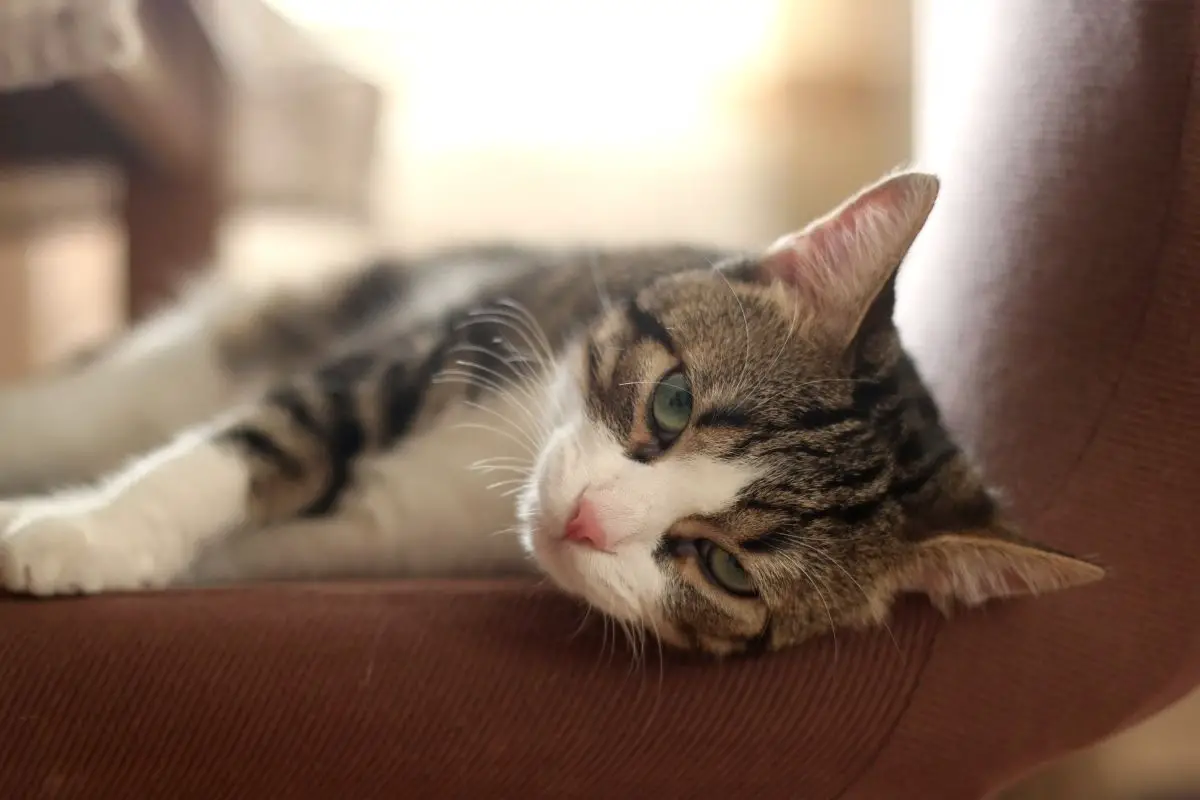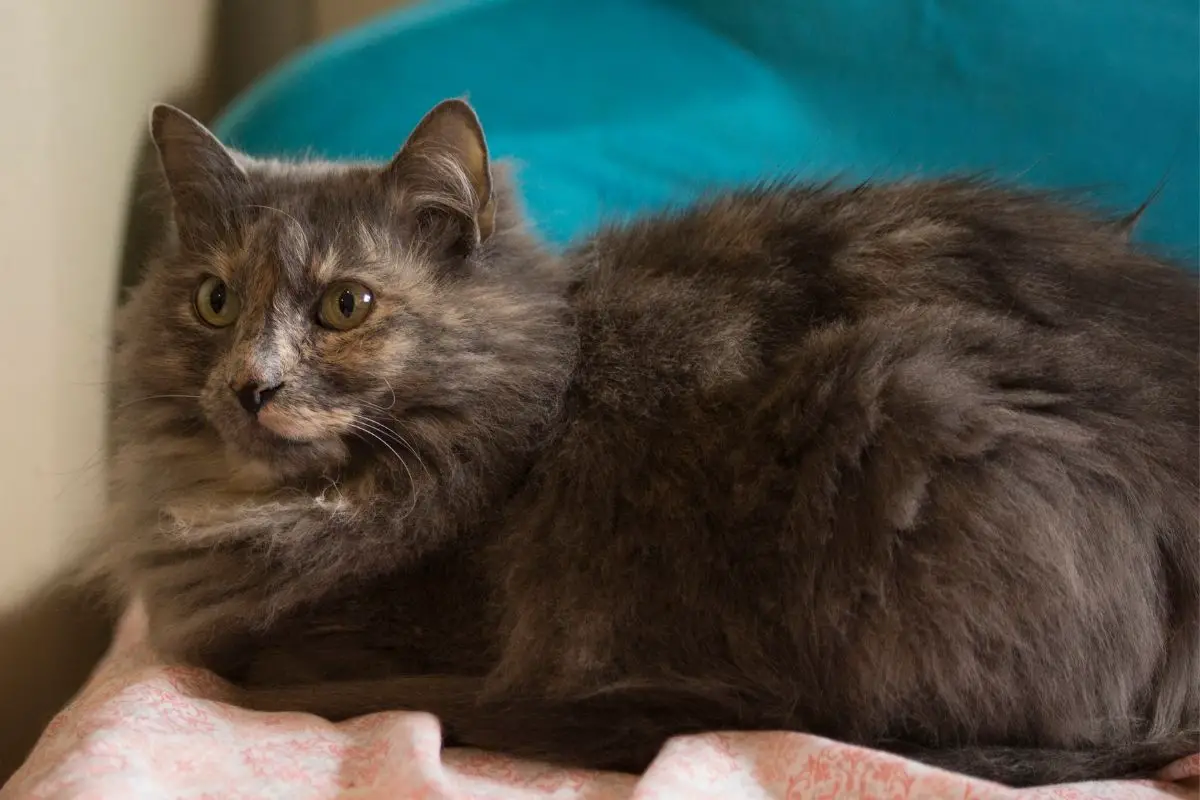An age-old debate is whether cats should be kept indoors or outdoors but do the different lifestyles contribute to how long a cat could live?
In this article, we are going to discuss the average lifespan of an indoor cat, and the pros and cons of keeping them inside.
Contents
Life Expectancy Of An Indoor Cat
The average life expectancy for a cat is 12 to 15 years, but this can vary depending on the breed and health conditions.
The most common causes of death, other than age, are cancer, kidney disease, heart disease, diabetes, liver problems, and infectious diseases.
An indoor cat would usually live for about 10 to 15 years if it has good nutrition, regular veterinary care, and plenty of exercise.

Indoor cats tend to live longer than outdoor cats because they are not exposed to as many risks.
Generally speaking, it is safer to keep cats indoors because they have fewer chances of getting into fights with other animals or being hit by cars.
They are also unlikely to get into trouble with dogs, which may be dangerous for them.
Additionally, they won’t be exposed to viruses and infections that outdoor cats are exposed to.
Indoor cats are however much more vulnerable if they happen to get outside by accident – they won’t have any awareness of road safety and are also much more susceptible to pick-up diseases as their immune system would not be as advanced as the cats that have been outside their entire lives.
Indoor cats tend to have a longer lifespan than outdoor cats because they don’t have to deal with all the dangers in the outdoor world.
Cats are very intelligent creatures and can learn how to use stairs, open doors, and even turn lights off and on. If you want your cat to live as long as possible, then make sure that it gets enough exercise and food.
It’s important to give your cat a balanced diet, including protein, fat, carbohydrates, vitamins, minerals, and water.
Cats need to eat and drink daily. Their nutritional requirements depend on their size, weight, and activity level.
Your cat needs at least one hour of playtime every day. This will help him stay mentally fit and active. You should also provide toys and scratching posts, so he can enjoy his time alone.
When it comes to grooming, it is best to brush your cat once a week using a soft bristle brush. For those who prefer a softer touch, you can use a slicker brush instead.
Make sure that you clean out its litter box regularly so that it doesn’t smell bad. Giving your cat a happy and healthy home and lifestyle will make it more likely for them to live longer.
Factors That Impact Life Expectancy Of A Cat
Factors that can change the life expectancy of a cat include the following:
- Breed: Some breeds are known to live longer than others. Persian cats, Maine Coons, Siamese, Ragdolls, and Abyssinians are some examples.
- Health Conditions: Sickness and injury can shorten the life of a cat. Diseases such as feline leukemia virus (FeLV), FIV, upper respiratory infection (URI), urinary tract infection (UTI), and dental disease can cause illness and pain. These illnesses can lead to premature aging and shortened life span.
- Age: As cats grow older, they become less active and their muscles weaken. This makes it harder for them to move around and climb stairs. Older cats also develop arthritis, which can affect their ability to walk and jump.
- Exercise: Regular physical activity helps improve overall fitness and longevity, and helps extend the lifespan of a cat.
Nutrition: A well-balanced diet consisting of high-quality proteins, fats, carbohydrates, vitamins, and minerals can contribute to a longer life.
Outdoor Cat Life Expectancy
The average life expectancy for an outdoor cat is between 8 and 11 years. Outdoor cats face several threats that can shorten their life spans.
Infectious diseases like feline herpesvirus 1 (FHV1), feline calicivirus (FCV), feline panleukopenia (FPL), and feline immunodeficiency virus (FIV) can shorten the life of an outdoor cat.
In addition, outdoor cats are prone to injuries from traffic accidents, dog attacks, and natural disasters.

Other factors that can shorten the life expectancy of an outdoor cat include poor nutrition, lack of shelter, exposure to extreme temperatures, and harsh weather.
Outdoor cats are exposed to many dangers that can shorten their lives, that indoor cats are not exposed to. Outdoor cats do however tend to get more exercise and have stronger immune systems than indoor cats.
Cats like to be outdoors because they love to hunt prey, explore new places, and chase after birds.
They spend most of their time outside in nature, exploring trees, bushes, grasslands, and other areas where they can find food and water.
The outdoor environment provides cats with plenty of opportunities to interact with other animals and people.
Being able to roam freely outdoors allows cats to socialize and meet new friends. Outdoor cats are often seen hunting rodents and insects, but they may also catch small reptiles, amphibians, and fish.
Now that you understand How Long Do Indoor Cats Live? Continue reading to learn Should you have an indoor or outdoor cat.
Should You Have An Indoor Or Outdoor Cat?
If you’re considering getting a cat, there are two main things to consider when deciding whether to keep it indoors or outdoors.
There are pros and cons to both, so it’s important to weigh these options carefully before making your decision. Indoors cats enjoy being near humans and have access to human care if needed.
You’ll need to provide a safe, warm place for your cat to sleep at night. It will also help to make sure that your home has good ventilation since cats prefer cooler environments.
Another pro of keeping your cat indoors is that indoor cats don’t have to worry about predators.
If your cat gets out of the house, he could run into a dangerous situation. Predators like coyotes, foxes, raccoons, skunks, snakes, owls, hawks, eagles, and even dogs can attack cats, especially during the day.
Outdoor cats also have to deal with the threat of disease and injury from other animals and people.
Final Thoughts
Indoor cats generally live longer than outdoor cats because they don’t have to deal with all the risks associated with living outdoors.
However, it’s important to remember that some outdoor cats live as long as 10 years. An indoor cat doesn’t have to worry about predation, disease, or injury.
On the other hand, indoor cats must contend with the risk of contracting infectious diseases such as FHV1, FCV, FPL, and FIV. Some indoor cats may also experience stress from having to share space with another animal.
There are risks to both types of lifestyle and each comes with its pros and cons, however, the bottom line is that indoor cats will mostly live a longer and safer life. Now that you have read “How Long Do Indoor Cats Live?”, read our other Blogs related to Cats here
Resources



